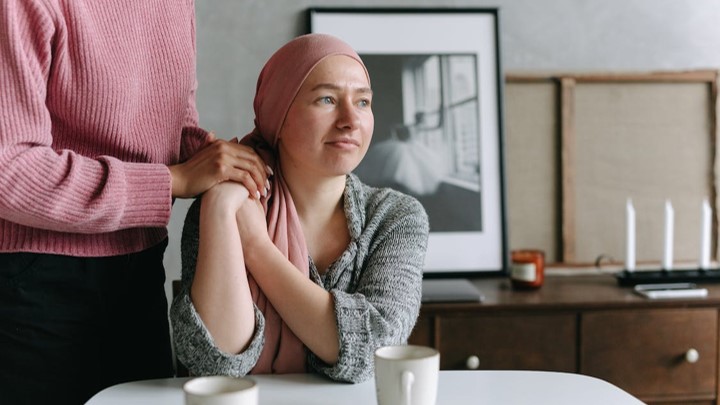Receiving a cancer diagnosis is a life-changing event that affects not only the patient but also their loved ones. Coping with the news can be a challenging and emotional experience, and it’s normal to feel overwhelmed, scared, and uncertain about the future.
When my mum was first diagnosed with breast cancer, it was disastrous news. I was personally traumatized and moody for days. I couldn’t help my emotions each time the thought flashed in my mind. We lost her after some medical battles. That experience inspired me to start this blog. However, it’s important to stay strong and supportive of your loved one during this difficult time.
In this article, we will discuss some practical tips on how to cope with cancer diagnosis of loved one.
How to Cope with Cancer Diagnosis of Loved One
1. Educate Yourself About Cancer
The first step in coping with a cancer diagnosis is to educate yourself about the disease. Cancer is a complex disease that affects different parts of the body in different ways. There are many types of cancer, and each has its own unique characteristics, symptoms, and treatment options. By learning more about the specific type of cancer that your loved one has been diagnosed with, you will be better equipped to understand what they are going through and how you can best support them.
You can start by asking your loved one’s healthcare provider for more information about their cancer diagnosis. You can also search for information online or read books and articles about cancer. However, be cautious about where you get your information from, as not all sources are reliable. Look for reputable websites, such as the American Cancer Society, National Cancer Institute, or Mayo Clinic, for accurate and up-to-date information.
2. Be There for Them
One of the most important things you can do for your loved one is to be there for them emotionally. A cancer diagnosis can be overwhelming and scary, and your loved one may need someone to talk to and confide in. Offer to listen to them and provide emotional support. Be empathetic and avoid minimizing their feelings or offering advice unless they ask for it. Sometimes, just being there to listen can make a huge difference.
You can also offer to accompany your loved one to their medical appointments or treatments. This can provide them with additional emotional support and can help you better understand their treatment plan. It can also be helpful to keep track of their appointments and medications, as well as any questions or concerns they may have.
3. Help with Practical Tasks
A cancer diagnosis can disrupt your loved one’s daily life. They may feel fatigued, experience physical limitations, or need to focus on their treatment and recovery. Offer to help with practical tasks such as grocery shopping, house cleaning, or driving them to appointments. These practical tasks can make a big difference in their overall well-being and can alleviate some of their stress. Additionally, you can offer to prepare healthy meals for them or help them with personal care tasks such as bathing or dressing.
4. Encourage Self-Care
Taking care of oneself is crucial during cancer treatment. Encourage your loved one to prioritize their physical and emotional well-being. This can include activities such as exercise, healthy eating, and relaxation techniques. Offer to join them in these activities to provide additional support and motivation. Some examples of self-care activities include:
- Exercise: Regular physical activity can help boost energy levels, reduce stress, and improve overall well-being. Encourage your loved one to engage in light exercises such as walking, swimming, or yoga.
- Healthy Eating: Proper nutrition is essential during cancer treatment. Encourage your loved one to eat a balanced diet with plenty of fruits, vegetables, whole grains, and lean protein. Offer to help prepare healthy meals or provide them with healthy snacks.
- Relaxation Techniques: Stress can negatively impact one’s health and well-being. Encourage your loved one to practice relaxation techniques such as meditation, deep breathing, or yoga.
5. Seek Support for Yourself
Caring for a loved one with cancer can be emotionally draining, and it’s important to take care of yourself as well. Seek support from friends, family, or a support group. Talking to others who are going through similar experiences can provide you with emotional support, advice, and a sense of community.
Also, consider speaking to a mental health professional if you are struggling to cope with the stress and emotions of caring for your loved one.
6. Be Patient and Flexible
Cancer treatment can be a long and challenging journey, and it’s important to be patient and flexible. Your loved one may experience physical and emotional changes during treatment, and their needs may change over time. Be willing to adjust your support and help them navigate the ups and downs of their treatment journey.
7. Celebrate Milestones
Celebrate milestones and victories with your loved one. Cancer treatment can be challenging, and it’s important to acknowledge and celebrate small victories along the way. This can include finishing a round of treatment, reaching a treatment milestone, or simply having a good day. Celebrating these moments can provide your loved one with a sense of accomplishment and motivation to continue their journey.
In Conclusion
Coping with a cancer diagnosis of a loved one can be challenging and emotional, but it’s important to stay strong and supportive of them. Educate yourself about their cancer diagnosis, be there for them emotionally, help with practical tasks, encourage self-care, seek support for yourself, be patient and flexible, and celebrate milestones.
Remember, your support and care can make a big difference in their treatment journey. Here is what Stranfor Hospital has to say on this.

